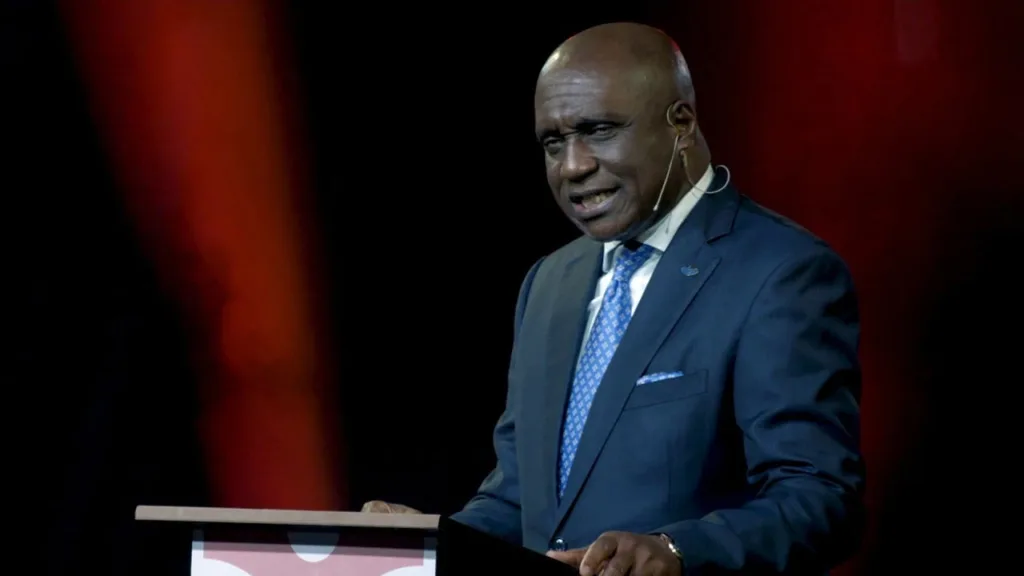“Jesus Never Associated with Poor People”: Pastor Ibiyeomie’s Controversial Claim Sparks Theological Debate Across Nigeria
Salvation Ministries Founder Argues Christ’s Ministry Opposed Poverty, Not Just Sin
In a statement that has raised eyebrows among biblical scholars and everyday Christians throughout Nigeria, Pastor David Ibiyeomie, founder of the influential Salvation Ministries in Port Harcourt, has made the controversial claim that Jesus Christ deliberately avoided association with poor people during his earthly ministry.

The Controversial Sermon That Has Nigeria Talking
Speaking to his congregation during a recent service at Salvation Ministries’ headquarters, Pastor Ibiyeomie presented a biblical interpretation suggesting that Jesus’s redemptive work was intended not only for spiritual salvation but also as a pathway to financial prosperity for believers.
“Jesus never visited any poor person in his house, check your Bible,” Ibiyeomie declared confidently. “That means he hates poverty. He visited Lazarus, they were not poor, they were giving him food.”
The pastor continued his theological argument by pointing to other biblical examples: “He visited a sinner, Zacchaeus, who was rich. Tell me one poor man Jesus entered his house. He hates poverty, that’s the meaning.”
Prosperity Gospel or Biblical Misinterpretation in Nigerian Context?
The Theological Framework in Nigeria’s Religious Landscape
Pastor Ibiyeomie’s statements align with what scholars from the Nigerian Association of Biblical Studies often identify as the “prosperity gospel” – a theological perspective that emphasizes material blessing as evidence of divine favor. This teaching has gained significant traction across Nigeria, particularly in urban centers like Lagos, Port Harcourt, and Abuja, though it remains highly contested among many mainstream theologians at institutions like the University of Nigeria’s Department of Religion and Cultural Studies.
According to biblical scholars at Redeemer’s University in Ede, Jesus likely lived modestly and frequently ministered to those on society’s margins, including the economically disadvantaged.
The Strong Position Against Poverty
In his sermon, Ibiyeomie took his position further, stating: “He [Jesus] hates poor people. He died for you not to be poor. How can you now come to church with some kind of mentality?”
The pastor drew a sharp distinction between initially coming to faith in poverty versus remaining in that condition: “You can come poor but you’re not permitted to remain poor. There’s nothing wrong with you coming to Christ as a poor man, but it’s wrong for you to remain poor. It is wrong.”
Examining the Biblical Record Through Nigerian Eyes
Historical Context of Jesus’s Ministry
Contrary to Pastor Ibiyeomie’s claims, many biblical scholars from the Nigerian Baptist Theological Seminary in Ogbomoso and ECWA Theological Seminary in Jos point to numerous instances where Jesus specifically reached out to and identified with the poor:
- In Luke 4:18, Jesus declared his mission included “preaching good news to the poor”
- The Beatitudes in Matthew 5 specifically blessed the poor in spirit
- Jesus frequently ministered to beggars, lepers, and others on society’s economic margins
- Matthew 8:20 records Jesus saying, “Foxes have dens and birds have nests, but the Son of Man has no place to lay his head,” suggesting his own simple lifestyle
Key Biblical Episodes
While Pastor Ibiyeomie highlighted Jesus’s visits to the homes of Lazarus and Zacchaeus as evidence of preference for the wealthy, the biblical record suggests a more complex picture according to scholars from Lagos State University’s Department of Religious Studies:
- Jesus chose disciples primarily from humble backgrounds (fishermen rather than the wealthy or politically connected)
- His parables often warned about the spiritual dangers of wealth (the Rich Young Ruler, the Camel through the Eye of a Needle)
- Early Christian communities described in Acts practiced radical economic sharing
Public Response and Theological Debate in Nigerian Christian Circles

Diverse Reactions Across Nigerian Denominations
The pastor’s statements have elicited varied responses across Nigerian social media platforms, theological forums, and church communities:
- Some prosperity gospel adherents from ministries like Winners Chapel have embraced the message as empowering
- Many traditional theologians from the Anglican Church of Nigeria and the Catholic Bishops Conference of Nigeria have expressed concern about the interpretation
- Interfaith dialogue specialists at the Nigerian Inter-Religious Council note the potential impact on Christianity’s public image
Dr. James Akinola, professor of New Testament studies at Crowther Graduate Theological Seminary, commented: “While the Bible certainly doesn’t glorify poverty, characterizing Jesus as someone who ‘hates poor people’ represents a significant departure from centuries of biblical interpretation and the textual evidence itself.”
Broader Implications for Nigerian Christianity
Pastor Ibiyeomie’s teachings reflect ongoing tensions within Nigerian Christianity about the relationship between faith and material prosperity, particularly relevant in a country with significant economic challenges. This theology raises important questions about:
- The purpose of Christ’s redemptive work
- The nature of blessing in the Nigerian Christian life
- The church’s responsibility toward economically disadvantaged communities across Nigeria
Understanding Different Approaches to Biblical Prosperity in Nigeria

Moderation Perspective
Many mainstream theologians from the Church of Nigeria suggest a more nuanced approach to biblical prosperity that:
- Acknowledges God’s provision and blessing may include material elements
- Recognize that suffering and economic hardship aren’t necessarily signs of spiritual failure
- Embraces the biblical call to generosity and care for those in need
The Social Justice Approach
Others from the Catholic Secretariat of Nigeria emphasize that Jesus’s ministry consistently demonstrated concern for societal inequities and marginalized groups, as evidenced in passages like Matthew 25:31-46, where Jesus identifies himself with the hungry, thirsty, and imprisoned.
Theological Resources
For those seeking deeper understanding of these complex theological questions, resources like Nigeria Bible Society‘s examination of wealth and poverty or scholarly treatments from National Open University of Nigeria provide valuable context.
Engaging with These Important Questions in Nigerian Faith Communities
As Nigerian Christians navigate these theological waters, several approaches can help foster productive dialogue:
- Return to primary biblical texts and examine them in historical context through resources from the Nigerian Bible Translation Trust
- Consider the full breadth of scripture rather than isolated passages
- Engage with diverse theological traditions represented at the Nigerian Theological Seminary Associations
- Apply critical thinking to popular religious messages



